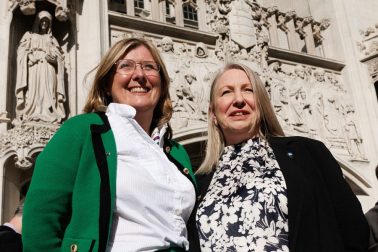Thirty years ago Sir Keith Joseph, portrayed by Sir Ian Gilmour, a fellow minister, as owning ‘a Rolls-Royce mind without a chauffeur’, sent a newly published book to every Cabinet colleague. Most groaned, some murmured oaths, and a lucky few skimmed it. The book was English Culture and the Decline of the Industrial Spirit (1850-1980) by Martin Weiner.
The author, like Correlli Barnett before him, assailed Victorian and Edwardian entrepeneurs and inventors for ignoring family business. Scores and scores of tycoons yearned to be assimilated into the landed establishment by spurning their own mills and factories. They denied the infernos of noise and squalor the capital investment required for new technology. Though driven by the non-conformist work ethic and responsible for making Britain the first industrial nation, they venerated land-owning and rural nostalgia. Social recognition was achieved at the expense of generating jobs and further prosperity in cities.
The Marshall family from Leeds, founders of the world’s greatest mills, acquired Lake District estate after estate; and in the twinkling of eyes daughters married old money eroding fast. To the Marshalls, Lakeland arcadia offered a status unrealisable from the Hades of Leeds.
By 1860, the largest ironworks on the earth’s surface belonged to the Bairds. Yet within a smattering of years, the global masters of iron from Lanarkshire morphed into Masters of Fox Hounds in Rutland. Tycoons were as uncomfortable with their industrial roots as the nation was with industrialism, otherwise known as trade.
It was no surprise that by the 1870s, the service sector (banking, insurance and shipping) exerted control over industry. Industrial capitalism gave way to supposedly more acceptable financial capitalism in the City of London. Here younger sons of tycoons sought status among crops of cardsharps. Again rather than reinvesting in mills and factories at home, cosmic sums were devoted to capital exports to the colonies, the United States and Latin America.
Few 19th-century magnates better epitomised these virtues and follies than James Morrison, the main subject of a finely researched history by Caroline Dakers.
Morrison, son of a Hampshire innkeeper, born in 1789 was despatched at the age of 11 to be an apprentice haberdasher in London. He accumulated a whole haberdashery fortune within 20 years and became known as the richest commoner of the 19th century. His maxim was ‘small profits, quick returns’ an early version of ‘pile them high, sell them cheap’ forged by Jack Cohen, Tesco’s founder, 100 years later.
Morrison, a marketing genius without a gift for words, educated himself by reading poetry. Southey became a friend. He undertook a grand tour, collecting thousands of objects including Florentine marble and Etruscan vases. In London he bought paintings by contemporaries Constable and Turner. He acquired two estates for himself — Palladian Basildon Park, and Fonthill in Wiltshire still under the care of descendants. Morrison dabbled as a Member of Parliament and invested in North America. Neither gave him as much satisfaction as his love of art and architecture.
When Morrison died in 1857 nine children were left estates and, with one striking exception, bachelor Charles, busied themselves in the countryside. They tottered on like heirs of other magnates without, strangle the notion, hint of commercial motivation. Milton’s line about ambition being the infirmity of noble minds fashioned conventional wisdom.
Only two Morrison grandchildren bore the family name. Dakers observes that ‘they were not remotely interested in making money, and chose to spend their fortunes with a recklessness that would have horrified their grandfather’.
James Morrison, in common with most tycoons, was a radical Whig. He extolled the virtues of free trade, competition and individualism.Yet as the years proceeded, heirs of tycoons, including the Morrisons, wandered into the Conservative party, sometimes as Members of Parliament. They failed to carry their radical Whiggism across the trenches, and joined a party hesitant between free trade and protectionism; and suspicious of individualism. Above all, they embraced a party plagued with ambiguities and already starting to arrange an orderly retreat for capitalism. This drift culminated with the premiership of Harold Macmillan, either the grandson of a Scottish crofter or son-in-law of Duke of Devonshire depending on his mood and surroundings. Macmillan was an architect of economic planning, a creed alien to Morrison.
Keith Joseph circulated the Weiner book 30 years ago. Perhaps Oliver Letwin, a minister and radical Whig, should follows suit with Dakers? Its insights and portents might inspire some weathercocks and sheep of habit around the Cabinet table to sharpen their beliefs.





Comments